Resilience and Psychological Wellbeing in University Hostelites
Rabia Dasti
Centre for Clinical Psychology, University of the Punjab, Lahore
* Nuzhat-ul-Ain
Centre for Clinical Psychology, University of the Punjab, Lahore
Noor Zainab
Nayab Rashid, Sana Asif, Fareeha Kanwal, Anam Tahir
The present study aimed to examine the relationship between resilience and psychological wellbeing in university women hostelites. Correlational research strategy was used in the study. One hundred and eleven women hostelites (N=111) from different hostels of Punjab University were included in the study. Socio-demographic form, State and Trait Resilience Scale and Ryff Scale of Psychological Well- Being were used for assessment. Descriptive analysis revealed food and cleanliness as major problems while internet and interference or any conflicts with roommates were reported as minor issues. Regarding solutions the most popular highlighted responses were „no solution‟, „ignoring‟ and „talking to the Warden‟. Talking to friends or going home at weekends were the least mentioned solutions. Most of the hostelites students reported satisfactory relationships with roommates, warden, and superintendent. Pearson Product Moment Analysis revealed significant positive relationship between resilience and psychological well-being. Trait resilience significantly and positively predicted psychological well-being (autonomy, environmental mastery and self-acceptance). The study can help to determine resilience promoting factors which would also enhance psychological wellbeing of hostelite students.
Keywords: hostelite, resilience, psychological wellbeing
The transition from a sheltered life at home to a self-dependent life at a university hostel has an influence on the psychological wellbeing of women students. Women hostel students have to face a number of stressors such as academic, social, emotional and physical stressors; therefore, effective coping strategies must be adapted in order to cope with stressors and lead a practical life (Mohanty, Mohanty, Balasubramanium, Joseph, & Deshmuk, 2011).
Coping strategies are the patterns that one adopts in order to deal with stressful situation. Some people handle and deal with the situation directly while others deny and withdraw from particular situation. Resilience is an adaptive coping strategy which is essential to enhance the psychological well-being of a person. Resilience has been defined as an inbuilt capacity to fight with or bounce back from the stressful event and adapt to challenging circumstances. The more resilient the person is, the more will be the resources to adapt to or change the adversity (Lazarus, 1993). Mohanty, Mohanty, Balasubramanium, Joseph, and Deshmuk (2011) stated that aversive circumstances for a hostel student may range from different issues (e.g., room-mate relations). Some situations may be handled through dialogue, but other may require adaptation to the circumstances in order to remain psychologically healthy. It is important to study resilience and psychological well-being in the hostel population to establish an empirical foundation for further psychotherapeutic measures.
Hiew (1998) explained four factors of resilience. First factor is „I Can‟ which is the societal and interpersonal resilience and begins from school it is strengthened as the social circle is increased. The second factor, „Facilitative environment‟, includes familial factors which promote resilience in the individual. Third factor includes „I am‟ as intrinsic factors which are usually promoted by non-familial social circle. Lastly, „I have‟ involves social skills used to interact with people.
Psychological wellbeing is a subjective term which varies according to life experiences and is based on a individuals‟ way of judgment, emotional responses and satisfaction with life (Diener & Lucas, 1999). The concept of psychological well-being was initially proposed by Ryff (1989). He identified six aspects of psychological well-being in his Ryff Scales of Psychological Well-being (RPEB) which are self-acceptance, positive relations, autonomy, environmental mastery, purpose in life and personal growth.
Along with the significance of resilience, psychological wellbeing also demands significant concern. The prevalence of psychological pathologies is rising. This increase in pathologies is a direct indication of aversive influence on psychological well-being. If a person is resilient enough to cope with problematic issues, he or she will have healthy psychological well-being (Fredrickson, 2004).
Fredrickson (2004) proposed Broaden-and-Build Theory of positive emotions which states that resilient individuals use positive sentiments to uncover the optimistic meaning in traumatic events. These positive emotions make an individual a creative and social person. Wellbeing enhances positivity which further leads to higher levels of resilience that ultimately give rise to the superior well-being.
Sauri and Hassanirad (2011) mentioned that psychological well-being is predicted by resilience. Suresh, Jayachander, and Joshi (2013) highlighted that resilience was a consequential predictor of well-being of the students. Singh (2014) indicated that hostelites employ better coping strategies as they learn to depend on themselves, as a result of living away from the protective home environment. Some situations may be handled by a dialogue, but others require adaptation to circumstances in order to remain psychologically healthy.
Ajmal and Irum (2012) highlighted the problems which are usually faced by hostelites from diverse areas includes struggling to fit in biases (language and ethnic), insensitivity of teachers, not being interested in adjustment issues of the hostelites, discrimination by themselves, violent acts by the students, and offensive comments about ethnicity. All this happens due to inability to cope with situations in a healthy manner and thus affects the psychological wellbeing of the students.
Objective of the Study
The objective of the present study was
- To study the relationship between resilience and psychological well-being in women university hostelites.
Hypotheses of the Study
In the present study, it was hypothesized that
- There is likely to be positive relationship between resilience and psychological well-being in women university hostelites.
- Resilience is likely to be positive predictor of psychological well-being in women university hostelites.
Method
Research Design
Correlational research strategy was used in the present study.
Sample
Total 111 women hostelites (N=111) from different hostels of Punjab University with the age range of 20-24 years old (M=21.36, SD= 1.19) were included in the study. Convenience sampling procedure was used. In inclusion criteria, students were selected who had been residing in the hostel for at least one year.
Assessment Measures
Demographic questionnaire.Demographic form was developed to study the demographics of the research participants such as age, socio-economic status, marital status, hostel environment, and relationship with hostel authorities and roommates.
State-Trait Resilience Scale ([STRS]; Hiew, 1998). It comprises of two subscales i.e. State Resilience and Trait Resilience. The State Resilience Scale is a 5 –point rating scale which required the participants to describe their current feelings. The reliability of the Sate Resilience Scale is a=.91 for the present research. The Trait Resilience Scale required the participants to provide answers keeping their past history since childhood under consideration. The reliability of the Trait Resilience Scale is a=.93 for the present research. It was translated by Kausar and Jabeen (2009).
Ryff Scale of Psychological Wellbeing ([RSPW]; Ryff, 1989). This 6-point Likert scale has 54 items. It assesses six facets of psychological well-being includes self-acceptance, positive relations with others, autonomy, environmental mastery, purpose of life, and personal growth. Internal consistency of sub-scales with their parent scales is .93, .91, .86, .90, .90 and .87respectively. Ryff (1989) determined the construct and criterion validity for all the sub-scales of the tool which proved to be adequate. Chronbach‟s alpha was found to be 0.85 by Ansari (2010) of Urdu translation
Procedure
First of all, the permission from the authors of the measures used in the study and hostel administration from where data was supposed to be collected, were sought. The process of data collection for the pilot study included 4 out of 10 hostels. Permission from the rest of the hostels was not granted due to security issues or unavailability of the hostel administration during specified timings. The authorities were informed about the nature and purpose of research.
Five participants were approached for the pilot study. The major problem of lack of corporation during the piloting was identified as the students were approached in the after noon when they were tired, and not willing to fill in the forms. To mitigate this issue, they were approached in the evening which increased the response rate. The average time of the administration of research questionnaires was 15 minutes. Ethical issues regarding confidentiality and identity of the participants were assured. They were told that the information they provided would be kept for educational purposes solely. Their queries regarding the research were welcomed and answered.
After the pilot study, the main study was conducted and data were collected from 111 women living in hostels. The participants were taken from different hostels of the Punjab University, Lahore. Information about nature, rationale, implication and protocol of research was provided. Consent of voluntary participation was taken.
Ethical Considerations
Approval from the Departmental Doctoral Program Committee was sought for the research. Permission to use the questionnaires from the respective authors was also sought. Permission to collect data from hostels was sought from the authorities of each hostel. Each participant was provided with the consent form and confidentiality of their information was also assured. It was ensured that the hours of their study was not affected by the research. The participants had the right to know about their results. Results were genuinely presented without any kind of fabrication.
Results
First of all the descriptive statistics were analyzed. The mean age of the participants was 22 years old. Satisfactory relationships with roommates, warden, and superintendent were reported.
Analysis revealed that food and cleanliness were major problems while internet and interference by roommates were the least disturbing issues. Regarding solutions, the most highlighted responses were „no solution‟, „ignoring‟ and „talking to warden for solutions‟ respectively. Talking to friends or going to home at weekends were the least mentioned solutions.
Table 1
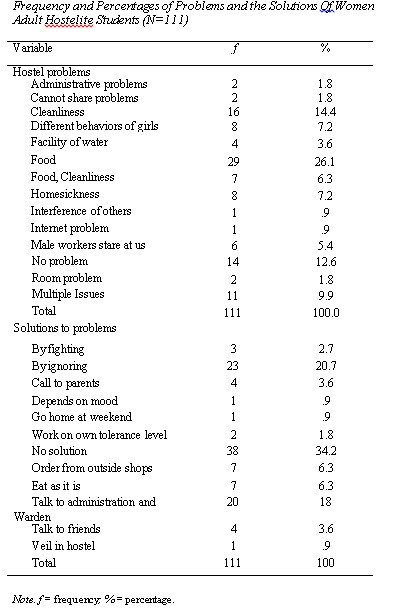
Pearson Product Moment Correlation of state resilience, trait resilience and psychological well-being is presented in table 2 which indicated that there is a significant and positive relationship between resilience and wellbeing.
Table 2
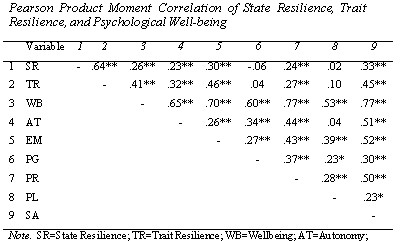
Table 3 shows that trait resilience significantly and positively predicted psychological well-being. The model turned out to be statistically significant F (2, 108) = 11.09, p < .001 and accounted for 17% variance in psychological wellbeing.
Table 3
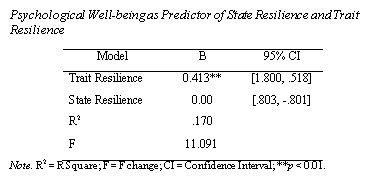
Tables 4, 5, and 6 show that trait resilience also predicted autonomy, environmental mastery and self-acceptance.
Table 4
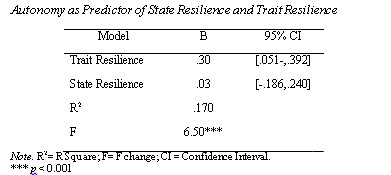
Table 5
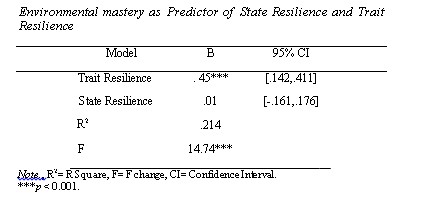
Table 6
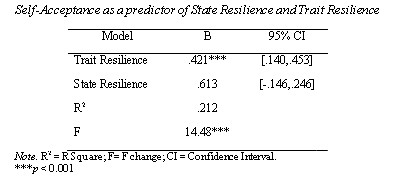
Discussion
TThe present study was aimed to explore the relationship between resilience and wellbeing. It was studied that how these variables influence the hostel population, specifically women. The age of the sample ranged from 20-24 years (M=21.36, SD=1.197) and the data was collected from four women hostels of the University of the Punjab. The socioeconomic status was mostly upper middle class.
It was important to study young women hostelite students since they face number of challenges, more importantly, go out and settle in new and unfamiliar place. Women of Pakistani society are essentially protected, sheltered and are not allowed to live alone therefore it is difficult for them to get adjusted to hostel life. It is observed that hostelite students are normally from less educated areas where either educational institute are not available or quality education is not being provided. This fact is also supported by the literacy ratio of rural verses urban areas of Punjab province as 52.0 to 74.6 respectively (Khan, 2009).
It was hypothesized that there is likely to be a positive relationship between resilience and psychological well-being. The results were consistent with the theories and the research literature. Broaden-and-Build Theory of positive emotions was coherent with the results as resilience provides individuals with healthy and positive coping resources that enhance wellbeing of the individual (Fredrickson, 2004). According to Sancho, Melendez, and Mayordomo (2012), resilient coping is a significant direct predictor of psychological well-being..
Ong, Bergeman, Bisconti, and Wallace (2006) suggested that trait resilience and psychological wellbeing had a poor relationship while stressors moderated the relationship. As score on trait resilience was low and the student was facing a stressful situation, it is more likely that his/her wellbeing would be compromised. Positivity helps in recovering effectively from daily stress; individuals who feel unable to bounce back from stressors are less likely to experience positive emotions. Suresh, Jayachander, and Joshi (2013) concluded that resilience predicted psychological wellbeing in school and college students in India. Results were analyzed which indicated that resilience was effective in predicting psychological well-being of the students.
Aroian and Norris (2000) stated that Russian immigrants to Israel showed that resilience increased the probability to remain psychologically healthy and reduce depression by about two-fold. Christopher and Kulig (2000) focused on the determinants of psychological well-being in Irish immigrants. Findings of the study revealed that number of annual health care appointments and higher resilience were the strongest predictors of psychological well-being. Costigan, Koryzma, Hua, and Chance (2010) studied about youth Chinese immigrants moving to Canada. Findings of the study suggested that if the adults have high resilience, they would have more psychological health, confidence in themselves and have stronger ethnic identity.
In the current study, food problem was one of the most mentioned problems. Hostel-specific problem such as harassment by male workers was mentioned in one of the hostels but it could not be highlighted as the majorly mentioned problems. The model presented by Irum and Ajmal (2012) highlight some specific issues faced by hostelites. The cultural differentiation acceptance, neglect of the authorities, struggle to fit in the new environment affects the hostelite‟s well-being and also effects by the factors that enhance resilience.
It is concluded that resilience is an important factor which predicts and enhances psychological well-being of the population and the absence of resilience promoting factors will ultimately affect the mental health of the women hostelites.
Limitations and Suggestions
One of the major limitations of the research was that only four hostels of one public university were included. Second, international students were not included in the sample. Locals were included and the translated versions of the measurement instruments were used which also excluded the possibility to study the international students. Regarding suggestions, purposive research study should be done to analyze the influence of economic issues on resilience and psychological well-being of the hostel students. Also a comparison of private and government hostels may give a detailed insight about personality factors of the hostelite students. Pakistani hostelites should be compared to students who come to study from abroad. Findings of this study will enable the psychological services in the university to focus on personality factors and coping strategies of the hostelite students and use them while counseling. Social implication of the study includes awareness about psychological factors and problems faced by the hostelites and developing practical means to solve them on a large scale.
References
Ansari, S. A. (2010). Cross validation of Ryff Scales of Psychological Well-being: Translation into Urdu language. Pakistan Business Review, 12(2), 244-259.
Aroian, K. J. & Norris, A. E. (2000). Resilience, stress, and depression in Russian immigrants to Israel. Western Journal of Nursing Research, 22(1), 54-67.
Christopher, K. A. & Kulig, J. C. (2000). Determinants of psychological well-being in Irish immigrants. Western Journal of Nursing Research, 22(2), 123-143.
Costigan, C. L., Koryzma, C. M., Hua, J. M., & Chance, L. J. (2010). Ethnic identity, achievement, and psychological adjustment: Examining risk and resilience in youth from immigrant Chinese families in Canada. Cultural Diversity and Ethnic Minority Psychology, 16(2), 264.
Diener, E. & Lucas, R. E. (1999). 11 personality and subjective wellbeing. Well-being: Foundations of Hedonic Psychology, (213).
Fredrickson, B. L. (2004). The broaden-and-build theory of positive emotions. Philosophical Transactions of the Royal Society B: Biological Sciences, 359(1449), 1367.
Hiew, C. C. (1998). Resilience: Development and Measurement.
Irum, R. & Ajmal, M. A. (2012). Adjustment problems of non local students in a local university.Pakistan Journal of Social & Clinical Psychology, 9(3).The Guilford Press.
Khan, A. & Mahmood, N. (2009). Education order in Punjab: A district level study.The Pakistan Development Review, 635- 652. 799-812.
Lazarus, R. S. (1993). Coping theory and research: Past, present, and future. Psychosomatic Medicine, 55(3), 234-247.
Mohanty, I. R., Mohanty, N., Balasubramanium, P., Joseph, D., & Deshmukh, Y. (2011). Assessment of stress, coping strategies and lifestyle in medical students. Indian Journal of Preventive & Social Medicine, 42(3), 294-300.
Ong, A. D., Bergeman, C. S., Bisconti, T. L., & Wallace, K. A. (2006). Psychological resilience, positive emotions, and successful adaptation to stress in later life. Journal of Personality and Social Psychology, 91(4), 730.